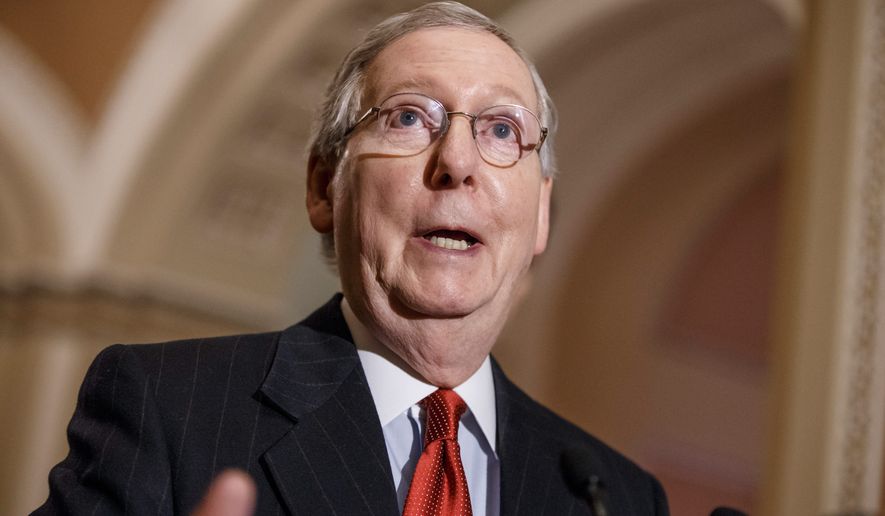Republicans will raise the government’s borrowing limit without threatening a default, Senate Majority Leader Mitch McConnell guaranteed Sunday, placating the markets but potentially surrendering the party’s leverage as Congress gears up for another debt showdown.
The current debt-ceiling holiday, to which Congress agreed a year ago, expires Sunday, starting the clock on debate and sending the Treasury Department scrambling to tap into its “extraordinary measures” to keep from breaching the limit.
Budget analysts say Treasury Secretary Jacob Lew has about seven months of spare room, meaning a deal would have to be reached by October or November.
Mr. McConnell, Kentucky Republican, said on the CBS program “Face the Nation” on Sunday that Republicans may try to attach some of their priorities to the debate but won’t force another shutdown showdown as it has in the past.
“I made it very clear after the November election that we’re certainly not going to shut down the government or default on the national debt. We will figure some way to handle that. And, hopefully, it might carry some other important legislation that we can agree on in connection with it,” he said.
It was a major retreat from what Mr. McConnell and House Speaker John A. Boehner, Ohio Republican, said four years ago when their party took control of the House and forced President Obama into a first round of debt negotiations.
Conservatives are likely to fight Mr. McConnell, arguing that a debt increase is a leverage point Republicans should use.
Mr. McConnell last month defeated those conservatives on the 2015 spending bills by teaming up with Democrats to pass final legislation after stripping language that most Republicans were seeking to limit Mr. Obama’s immigration actions.
House Minority Leader Nancy Pelosi, California Democrat, said she hoped Republican leaders would show similar restraint in the debt fight and urged action as quickly as possible to try to keep the economic recovery moving.
“There is no reason that the Republican Congress should not act immediately to take the prospect of a catastrophic default off of the table,” Mrs. Pelosi said. “Failure to act would have savage impacts on American families: tumbling retirement savings and soaring interest rates for student loans, mortgages, credit cards and car payments.”
Congress has written into law a borrowing limit for the federal government, but in the latest debt showdown at the beginning of last year, lawmakers canceled having a statutory limit on the debt, instead creating a debt-ceiling holiday until March 15, 2015.
That meant Mr. Obama was free to borrow what he needed to keep the government running until that date, when the debt limit will be reset to whatever the total debt is at that point.
On Thursday, the debt stood at $18.147 trillion.
Mr. Lew has several financial tools at his disposal that can keep the U.S. from breaching its limit for months, though in a letter to Congress last week he said quick action — without another showdown — is critical.
“I hope that Congress will address this matter without controversy of brinksmanship,” Mr. Lew said.
Congress is about to enter the annual budget season, which could be a chance to get ahead of the debt deadline.
If no ceiling increase is approved, the government would have to either limit its expenses to cash that comes in or else default on its debt obligations.
Debt has doubled over the past eight years, from $9.06 trillion on Oct. 1, 2007, to more than $18 trillion now.
The surge of debt during Mr. Obama’s first two years in office — from $10.6 trillion at his 2009 inauguration to $13.7 trillion on Election Day in 2010 — helped power Republicans to huge electoral victories including control of the House.
That set up the 2011 debt fight that culminated in that summer’s major deal, when the debt limit was raised by more than $2 trillion in exchange for immediate spending caps and so-called budget sequesters, which are in place through the end of the decade.
Mr. McConnell and Mr. Boehner emerged from that fight declaring that they had set a precedent and every future debt increase also would be coupled with spending cuts.
Mr. Boehner vowed that the cuts would match “dollar for dollar” the amount of every future debt increase. Mr. McConnell was less specific, saying instead that “never again will any president, from either party, be allowed to raise the debt ceiling without being held accountable for it by the American people.”
But 2011 turned out to be the high point. In a 2013 debt fight, Congress won no new spending restraints but got Senate Democrats to agree to write a budget for the first time in years. Democrats followed through, but then House Republicans balked at going to conference and working out a final agreement.
Republicans won no concessions in last year’s debt fight, instead settling on the debt-ceiling holiday that suspended the limit until this coming weekend.
• Stephen Dinan can be reached at sdinan@washingtontimes.com.




Please read our comment policy before commenting.